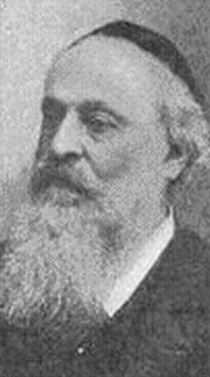Moritz Güdemann
| Moritz Güdemann | |
|---|---|
 Portrait of Moritz Güdemann | |
| Born |
February 19, 1835 Hildesheim, Germany |
| Died |
August 5, 1918 (aged 83) Baden bei Wien, Austria |
| Nationality | Austrian |
| Occupation | Rabbi and historian |
Moritz Güdemann (Hebrew: משה גידמן, born at Hildesheim, Germany, February 19, 1835; died at Baden bei Wien, August 5, 1918) was an Austrian rabbi and historian. His most important work is Geschichte des Erziehungswesens und der Cultur der abendländischen Juden während des Mittelalters und der neueren Zeit.
Life
Güdemann attended the Jewish school in Hildesheim, and thereafter went to a Catholic Gymnasium. He was educated at the University of Breslau (Ph.D. 1858), and took his rabbinical diploma (1862) at the newly founded the Jewish Theological Seminary there.[1] In the latter year he was called to the rabbinate of Magdeburg; in 1866 he went to Vienna as preacher, where he became rabbi in 1868, and chief rabbi in 1892.
He married his first wife, Fanny Spiegel, in 1863. After her death he married Ida Sachs, with whom he had four children.
Works
Güdemann wrote on history of Jewish education and culture, and was associated with the Wissenschaft des Judentums movement. In addition to dozens of articles, he published the following monographs:[2]
- "Die Geschichte der Juden in Magdeburg," 1865
- "Die Neugestaltung des Rabbinenwesens," 1866
- "Sechs Predegten," 1867
- "Jüdisches im Christenthum des Reformationszeitalters," 1870
- "Jüdisches Unterrichtswesen Während der Spanisch-Arabischen Periode," 1873
- "Religionsgeschichtliche Studien," 1876
- "Geschichte des Erziehungswesens und der Kultur der Abendländischen Juden," 3 vols., 1880–88
- "Nächstenliebe," 1890
- "Quellenschriften zur Gesch. des Unterrichts und der Erziehung bei den Deutschen Juden," 1894
- "Das Judenthum in Seinen Grundzügen und nach Seinen Geschichtlichen Grundlagen Dargestellt," 1902
- "Das Judenthum im Neutestamentlichen Zeitalter in Christlicher Darstellung," 1903.
On Zionism
In his Nationaljudentum (Vienna, 1897) he wrote against the tendencies of Zionism to lay more stress on the national than on the religious character of Judaism, for which he was severely attacked by the friends of the Zionist movement. As far back as 1871, however, he had strongly protested against the proposal of the Jewish community of Vienna to strike from the prayer-book all passages referring to the return of the Jews to the Holy Land (compare his sermon "Jerusalem, die Apfer und die Orgel," 1871), and had even gone so far as to threaten to resign from the board of trustees.
References
- ↑ Dorne, Verena, Seminary, retrieved 2012-11-18
- ↑ Wachstein, Bernhard. "Bibliographie der Schriften Moritz Güdemanns" Bericht der Israelitischen Allianz zu Wien (1931)
External links
- Guedemann Sermons: Over 600 of Guedemann's sermons have been digitized by the Leo Baeck Institute, New York. (German)
- Aus Meinem Leben: Guedemann's memoir has been digitized by the Leo Baeck Institute, NY. (German)
- Guide to the Moritz Guedemann Collection at the Leo Baeck Institute, NY.
- Entry in the Jewish Encyclopedia
- Moritz Güdemann: Rabbi, Historian and Apologist by Ismar Schorsch, in Leo Baeck Institute Yearbook (1966) 11 (1): 42-66. doi: 10.1093/leobaeck/11.1.42
![]() This article incorporates text from a publication now in the public domain: Isidore Singer, Ludwig Blau (1901–1906). "Güdemann, Moritz". Jewish Encyclopedia.
This article incorporates text from a publication now in the public domain: Isidore Singer, Ludwig Blau (1901–1906). "Güdemann, Moritz". Jewish Encyclopedia.
|